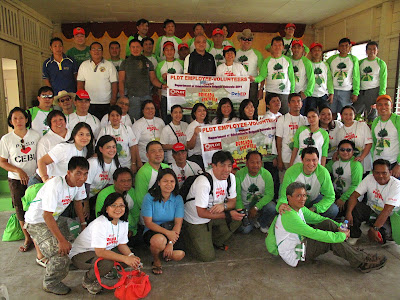A mile of difference
PBSP's 4th OLANGO CHALLENGE creates
worthwhile impact—one stroke at a time
AS the sun beat mercilessly against her skin, Camila Taylor steadily braved the waters of Tambuli Beach Club in Lapu-Lapu City with hopes of completing her 2-kilometer course. In between drinking water to replenish her reserves and stroking aimlessly at the open sea, she thought, for a moment, of giving up.
It was the first time for Taylor, Cebu Manager of Cathay Pacific Airways, to swim for an open-water competition introduced by the 4th OLANGO CHALLENGE in Cebu. As what is characteristic of an open water swimming event, only small boats and kayaks that serve as water stations as well as her co-swimmers kept Taylor from drifting away from the race course. When she realized that the swimmers were no longer on her sight, fear gripped her, thinking she had finally lost her way in the open sea.
But she plowed on, knowing that every stroke she took would help the communities of Olango Island, as what the event promises.
“Just thinking of the benefit the people from Olango can get from my participation spurred me to just keep on swimming,” she said.

Like Taylor, more than 100 amateur and professional swimmers from all over the country and as far as America and Japan competed at the 4th OLANGO CHALLENGE last April 30 to test their swimming skills and contribute to the development of Olango, an island of Lapu-Lapu City whose communities solely depend on fishing as their livelihood.
Launched by Philippine Business for Social Progress (PBSP) and Philippine Aquatic Sports Association (PASA) in 2008, the event raised more than P3.9 million in three years to help improve the lives of 2,300 families in Olango through the delivery of basic social services, the provision of sustainable income opportunities and the rehabilitation of the unique environment of the island.
PASA President Mark Joseph stated how the OLANGO CHALLENGE has helped swimmers hone not just their swimming skills but their compassion for the community as well.
“We care, we love Cebu, we love swimming and together we help make a difference,” he said when they launched the 3rd staging of the OLANGO CHALLENGE last year with more than 50 swimmers. Proceeds of that event went to the construction of a two-classroom school building for grade 6 pupils of Candagsao Elementary School.
Eleven-year-old Jophet Barong was one of the pupils who benefited from the classroom. Two years ago, when he was in fifth grade, he recalled sharing a classroom with his older brother, who was then grade 6 because their school lacked the facilities to support their studies.
“It was either we share a classroom or we study outside, where those trees are,” he said, pointing to a clearing between two acacia trees where several rows of armchairs previously lay.
“I’m happy pupils who will soon reach grade 6 won’t need to use that place and worry about the rain and excessive sunlight when studying. I’m happy because I know they would feel as inspired as I was when I studied in an actual classroom we could call as our own,” he added.
He hopes that the event will continue to help Olango Island, especially that support from other agencies remain scarce in their area.
For this year’s OLANGO CHALLENGE, proceeds are programmed for use towards an extensive reforestation effort of Olango as well as swimming lessons for children in Mactan and Olango.
Record breakers. As a pioneering event of such kind in the country, the OLANGO CHALLENGE also hopes to promote open-water swimming in the country now that is included in the Olympics and the Southeast Asian (SEA) Games calendar.
The 30th of April was a record-breaking day with swimmers besting their personal records and collecting on the pledges of their peers to help organizers meet this year’s P1.5 million fundraising target. This year also witnessed the largest number of participants to date with 124 swimmers.
“We are happy that the event is growing. We have so many participants, particularly in the corporate side and a lot of local participants compared to the previous stagings,” PBSP Visayas Executive Committee Chairman and Board of Trustee Jose Antonio Aboitiz said.
Loren Dale Echavez and Noel Cañeda of Cebu Blue Marlin Swim Club bagged the top spots for the 6K competitive category. Echavez won by completing her course at 1 hour and 23 minutes while Cañeda won with 1 hour and 20 minutes. Respectively, Emilio Rafols of Polo Duck Pirate and Trina Cañeda of Cebu Blue Marlins Swim Club topped the 2K competitive category with 27 minutes for Rafols and 31 minutes for Cañeda.
This year’s competition also introduced the 2K relay category with the Sugbu Triathlon Team as the winners. Team VECO won the Best Company Team award while Team Imperial Palace won Best Resort Team.

The event also witnessed the participation of VECO representative Junnie Climaco, at 54 years old, became the oldest competitor for the 4th OLANGO CHALLENGE. He plans to join the event next year.
More than PhP 204,000.00 worth of prizes were awarded to winners while champions of each category received Timex watches and Speedo gift certificates. Winners of the 6K competitive category also received a round trip ticket for Hong Kong from Cathay Pacific.
Major sponsors of the event include Aboitiz Foundation, Inc., Nestlé Philippines, Inc., TMX Philippines, Inc., Cathay Pacific Airways and Pilipinas Shell Petroleum Corporation, among others.







